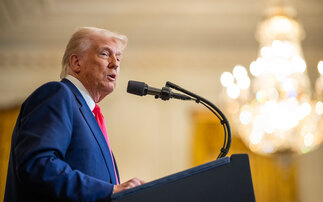The Green Party conference has been used to operating on the political sidelines, but this year it did a better job than most at identifying the huge risks and opportunities the UK faces
You would be forgiven for missing them, given the big political story of the weekend was a former Conservative Party leader floating the idea the UK could, and perhaps should, go to war with Spain, but the past few days have seen two intriguing developments from opposite ends of the political spectrum that could yet have major long term repercussions for the green economy.
Over on the far right former UKIP donor and self-styled Bad Boy of Brexit Aaron Banks gave a surreal interview with The Observer, which sketched out in surprising detail how a form Trumpist/Putinist populism could be imported to the UK. It was all there: the plans for a new political movement that will field candidates at the next election, the barely concealed admiration for autocracy, the contempt for elites, the harnessing of Big Data for political gain. Admittedly disdain for environmentalism was not mentioned, but given the praise for the newly self-declared climate sceptic Vladimir Putin and UKIP's historical stance on climate change it is a reasonable to suspect it is lurking in the background.
A row is bubbling away in Leave circles as to how much credit Banks and his millions can take for Brexit, but one thing is clear: if you want to know why Theresa May opted to interpret the referendum vote as a mandate for the hardest Brexit imaginable it can be found in the focus groups that reveal Leave voters are nurturing sky high expectations on immigration and the return of sovereignty, and Banks' plans for a new populist movement to hoover up votes from those who are left disaffected. Number 10 has nothing to fear from Jeremy Corbyn, it is easy to envisage a scenario where regardless of UKIP's on-going implosion it has a great deal to fear from a British Tea Party.
Of course, none of this may come to pass. The UK's electoral system is notoriously unyielding to insurgent parties, as Nigel Farage's experience of countless election defeats can testify. Moreover, the government seems intent on not leaving much ground available to the right for any serious challenger to occupy.
And yet it would be wrong to under-estimate Banks, Farage, and their Breitbart allies. They have played an undeniably important role in delivering first the referendum, then Brexit, and then President Trump. They have run rings round the electoral commission, the mainstream media, and the political establishment on both sides of the Atlantic - Banks insists no laws were broken, but confidently declares his campaign "pushed the boundary of everything, right to the edge", adding at one point that "you're looking for a smoking gun but there's a smoking gun on every table! And no one cares. No one cares!"
The official Vote Leave campaign is desperate to argue the influence of Banks, Farage, and co has been overstated, and in the nuts and bolts of the election campaign they may have a point. But, then again, it is a member of the supposedly respectable Leave camp who was this weekend talking about sending battleships to Gibraltar. Pretty much everything that has happened since the referendum, with a few honourable exceptions like the approval of the fifth carbon budget, has pushed the UK's political centre of gravity in the direction the Breitbart crowd would like it to take it.
Which brings us to the weekend development from the other end of the spectrum: The Green Party conference and a speech by the Party's co-leaders which you cannot imagine being given by any other mainstream leader, and not just because there were two of them on stage.
Just like Banks' interview, the speech by Caroline Lucas and Jonathan Bartley is surprisingly insightful and worth reading in full. Inevitably, there is all the usual party conference tub-thumping, terrible jokes, and some of the Greens' trademark worthiness. But here too is a crystallisation of the risks currently faced by British politics - "when we see fascism, we will call it fascism", "nationalism is not the only alternative to corporate globalisation", "what we face is a right-wing coup" - and the immense opportunities that could yet be realised - "we need a radical green industrial strategy that transforms Britain into the most resource efficient economy of our times; where Britain is a world leader in tackling climate change".
I'm not a Green Party member and have long harboured reservations about the Party's ability to punch below its weight. Its critique of capitalism too often morphs into a knee-jerk anti-business rhetoric that fails to recognise the business community's crucial role in the low carbon transition. Its flirtations with the hard left are sometimes hard to stomach and its reluctance to challenge the stereotype of hair shirt environmentalism has done the wider environmental movement few favours.
But much of Bartley and Lucas' speech offers the kind of clear-eyed opposition and radical policy thinking the country desperately needs right now.
The recognition some form of electoral alliance may be the only way to stop the UK morphing in to a one party state dominated by a centre right government under pressure from a hard right insurgence is something all centrist parties should already have come to terms with.
On the policy front the proposal for a three day weekend may have caught the headlines and prompted a fair few sneering guffaws, but just like the universal income the Party proposed at the last election it wrestles with hard truths no other party is willing to engage with. UK productivity is so poor Germans produce in four days what the UK produces in five; we could work less with no economic cost and huge health and welfare benefits. Meanwhile, the march of automation means shorter working hours may be required to head off the risk of mass robot-induced unemployment.
Meanwhile, the Greens' calls for a post-Brexit Environmental Protection Act and green industrial revolution are precisely the kind of popular long term policies the official opposition should be loudly demanding. There are people within government who would actually welcome such pressure, simply to provide a political counter weight to their increasingly vocal climate sceptic colleagues. If only the supposedly radical Jeremy Corbyn had a fraction of Lucas and Bartley's eloquence and genuine radicalism.
More broadly, the Greens' plea for a hope-fuelled vision of the future may risk lapsing into the naïve happy-clappy positivity for which the Party is caricatured. But it is hard to see a route back for centrist politics in the UK that does not more effectively channel a sense of optimism, community, and progressive patriotism.
Why does all this matter for business leaders and the green economy?
The past few years has been a lesson in how ideas from the extreme end of the political spectrum can, for better or worse, quickly break into the mainstream. Binding climate change targets, renewable energy dominance, a renaissance in cycling, 20mph speed limits, these are just a few of the Green Party concepts once dismissed as barmy by mainstream commentators but which are now the norm. Similarly, the once marginalised proposals of Eurosceptics are now the stated policy of the government of the day, up to, but thankfully not yet including, the invasion of Spain.
Banks and co versus Lucas and Bartley? I hope it does not come to that. I hope there is way for the political centre to revive itself, drawing on the best of the optimistic positioning and innovative policy thinking being pioneered by the Greens and others. But it is worth keeping a close eye on the battle between the two extremes of the British political spectrum, because there might come a point where you have to pick a side.









